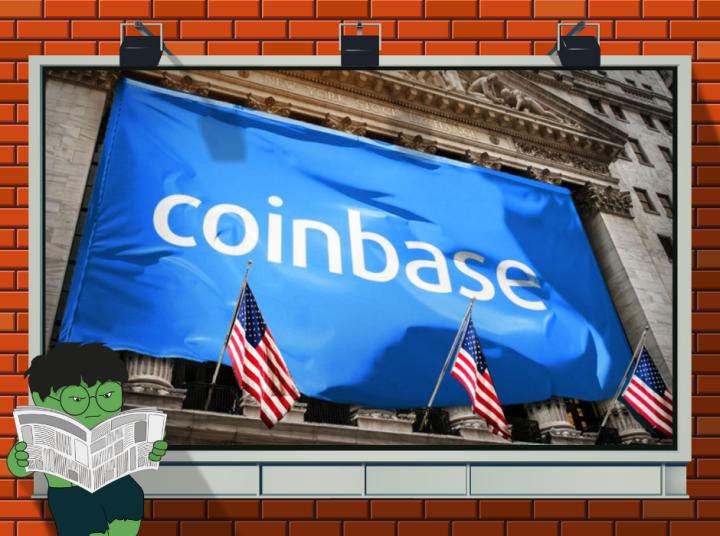The former president's decentralized finance (DeFi) token has poor sales due to multiple issues, including investor restrictions and non-transferability.
The token launch of former US President Donald Trump can be considered a failure.
On October 16, former US President Donald Trump launched his "World Liberty Financial" (WLFI) token. The token's website claims it will allow investors to have voting rights in future DeFi protocols.
However, after nearly a day of trading, the token's sales performance was rather poor. As of 10:00 UTC on October 17, the token website showed that only 848.63 million WLFI (worth $12.7 million based on the pre-sale price) were sold, with the remaining 1.91 billion tokens (worth $287 million) unsold. The first day's sales volume was only 4.24% of the total.
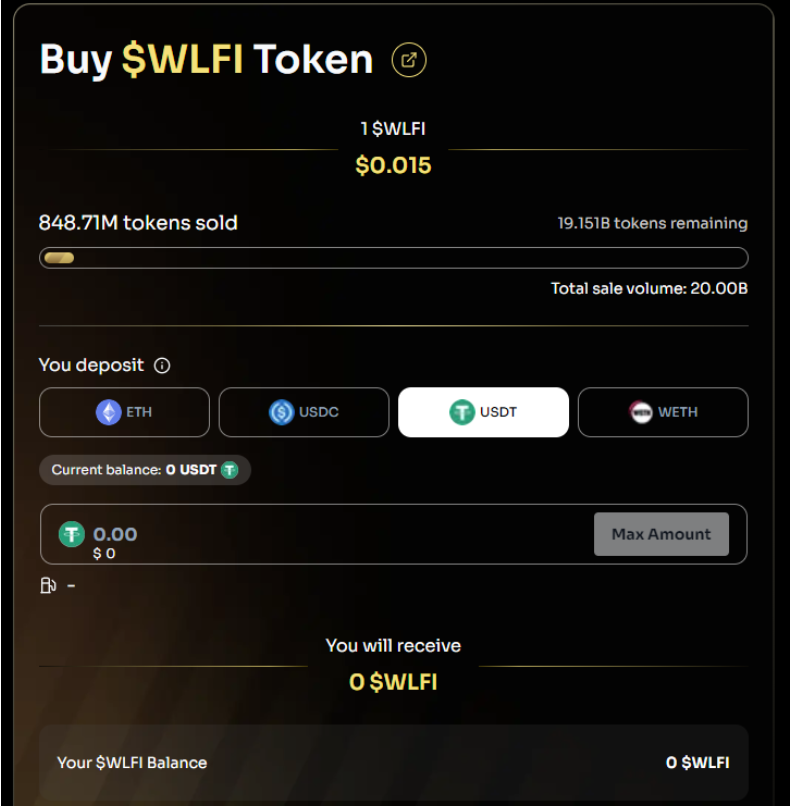
Number of WLFI tokens sold. Source: World Liberty Financial.
But despite the former president's fame, why did the token perform so poorly in its first day of trading? Here are five possible explanations for the token's underperformance.
Restrictions on purchasing Trump's token
Unlike most token pre-sales that are open to anyone and can be purchased anonymously, Trump's DeFi token is only available for purchase by accredited US investors or non-US residents.
When users first visit the website, they are asked whether they reside in the US and "meet the definition of an 'accredited investor' as defined under Rule D of the US Securities Act of 1933", or if they reside outside the US.
Users who do not fall into these two categories will not be able to proceed further on the website.
Buyers cannot obtain the tokens until they pass a Know-Your-Customer (KYC) check to verify their identity. It can be inferred that people claiming to be US residents must provide an affidavit to prove they are accredited investors to pass this check.
According to Investopedia, US resident investors can only be considered "accredited investors" if they have an annual income exceeding $200,000, a net worth over $1 million, or are general partners, executive officers, or directors of the issuer of the unregistered securities.
These standards effectively exclude the vast majority of Americans.
Users can bypass this requirement by clicking "I reside outside the US", but they must then provide proof of residence outside the US to proceed.
The fact that many of Trump's supporters are US residents and not accredited investors may be a major reason for the slow token sales.
Normally, such requirements can be easily circumvented. Non-US crypto users can purchase the tokens from the website and then sell them to US residents through decentralized exchanges.
US residents can use anonymous crypto addresses to identify themselves when buying the tokens, making it nearly impossible for the government to determine if they are US residents, providing the sellers with a reasonable denial.
However, this did not happen with Trump's WLFI token, as the token is non-transferable.
WLFI is non-transferable and non-tradable
Unlike most cryptocurrencies, WLFI cannot be transferred from one wallet to another. This means accredited investors cannot sell the tokens to non-accredited investors or to US residents.
In fact, holders cannot sell the token at all. The only thing they can do is wait for the launch of the DeFi protocols, where the developers claim holders will be able to vote on proposals affecting those protocols.
The terms and conditions of the token sale explicitly state that the token cannot be transferred to other users.

WLFI sale terms and conditions. Source: World Liberty Financial.
The inability to sell the tokens means investors cannot profit by selling them at a higher price, and there is no expectation of holders gaining any profits from the upcoming DeFi protocols.
Website crashes
Despite only selling a few hundred million tokens, the website was unable to handle even this small amount of traffic. Some users reported receiving a "This page isn't working" message when trying to purchase the tokens.
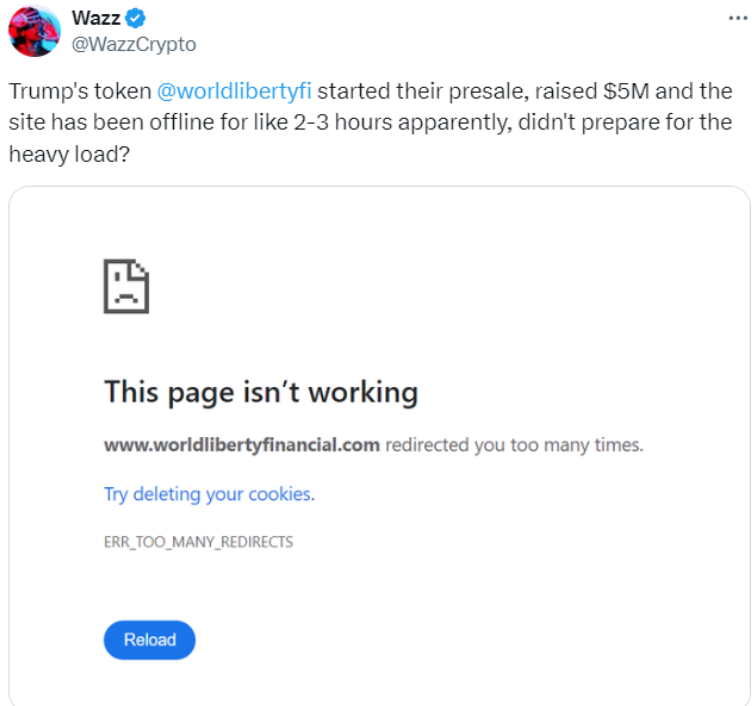
Source: Wazz
Due to the website crashes, some users may have been unable to purchase WLFI, and after considering their plans, they may have decided to hold onto their funds instead. This could further reduce token sales.
The WLFI team has not yet explained the reason for the website crashes, but they may have anticipated sales to be better than they actually were. As a result, they may not have prepared enough servers to handle the website traffic, leading to the crashes and further exacerbating the situation.
People perceive it as a scam
Another possible reason for the poor token sales is a general perception that the project is a scam or a small-scale fraud.
Some observers have suggested that the non-transferability was deliberately hidden to sell more tokens.
Although the non-transferability is clearly stated on the token website, some believe the project did not anticipate buyers would read the fine print.
Trump's announcement of the token caused such a stir on the X platform that a community explainer was posted. The explainer noted: "The fine print mentions the 'tokens' are non-transferable and locked in wallets, so you can't withdraw them until this 'plan' deems it appropriate. Please read the fine print!"
Vladimir Djukic, the founder of the passive income token Reflecto, shared this announcement:
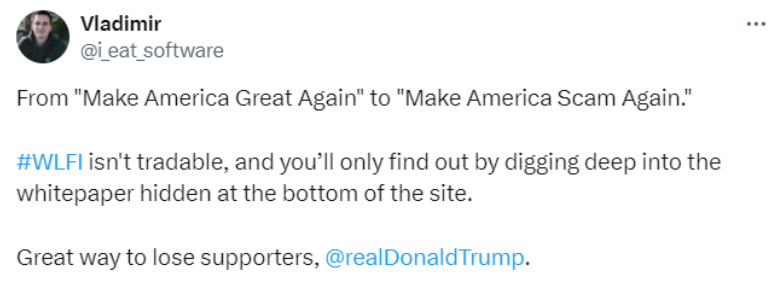
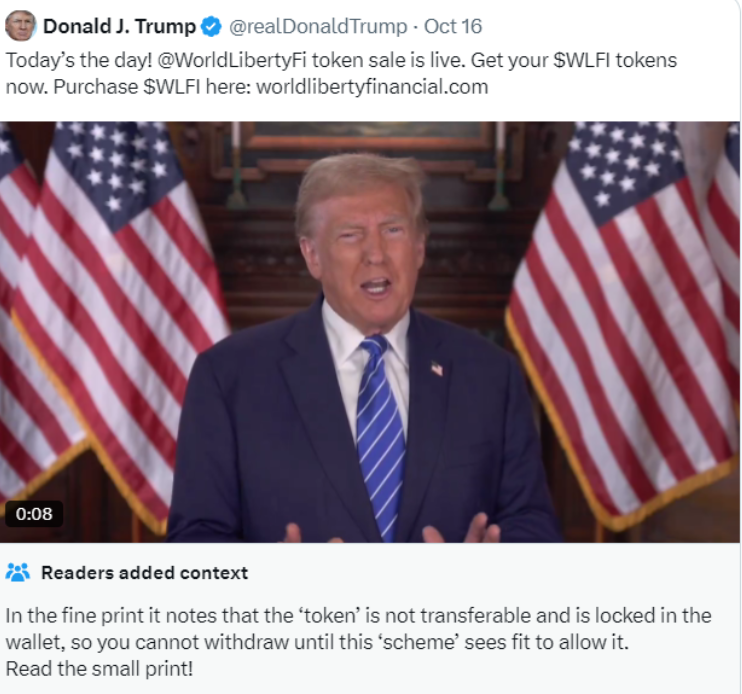
Complicated purchase process
Another reason for the poor token sales could be that the purchase process is too complicated for many potential investors.
Some may not know if they are accredited investors, as they may not even be aware of what the term means.
There may also be some uncertainty about what it means to "reside" in the US. For example, if a person visits the US for a few months in a year but spends the rest of the time in other countries, they may not be sure which button to click.
Even if they successfully reach the token sale page, they must first pass a KYC check before they can complete the final step of the purchase. Some users may not trust the KYC provider Sumsub and may be unwilling to upload their passports or driver's licenses.
Even if they are willing to trust the KYC provider, they may still be reluctant to upload their documents.
The overall complexity of the purchase process may be another reason why many supporters decided to skip the token sale, even if they believe the token will be profitable in the long run.
Despite the poor token sales, Trump still gained the support of many in the US crypto community. According to data from the Federal Election Commission, a political action committee associated with Trump raised over $7.5 million in cryptocurrency between July and September.
According to research by Galaxy Digital, Trump's opponent, Vice President Kamala Harris, is perceived to be more crypto-friendly than the current President, Joe Biden.
She recently tried to appeal to crypto voters, promising reasonable asset regulation in her "Opportunity Economy Pledge".







